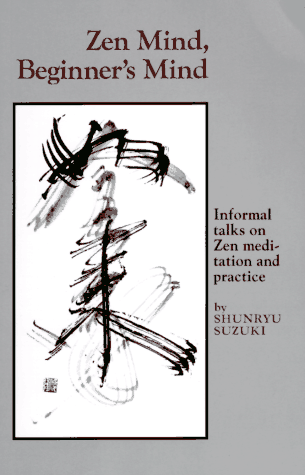
There are several poor ways of practice that you should understand. Usually when you practice zazen, you become very idealistic, and you set up an ideal or goal which you strive to attain and fulfill. But as I have often said, this is absurd. When you are idealistic, you have some gaining idea within yourself; by the time you attain your ideal or goal, your gaining idea will create another ideal. So as long as your practice is based on a gaining idea, and you practice zazen in an idealistic way, you will have no time actually to attain your ideal. Moreover, you will be sacrificing the meat of your practice. Because your attainment is always ahead, you will always be sacrificing now for some ideal in the future. You end up with nothing. This is absurd; it is not adequate practice at all. But even worse than this idealistic attitude is to practice zazen in competition with someone else. This is a poor, shabby kind of practice.Recently I've been reading Shunryu Suzuki's teachings on Buddhist meditation practice, known as 'zazen,' as an analogy to musical practice. As in meditation, musicians try and maintain an elevated state of focus, to purify ourselves of all excess thoughts and doubts, to ultimately transcend our limitations and become part of something greater than ourselves. I wonder if the analogy doesn't break down a bit here, though. My practice has always seemed to center on idealistic thinking - whether it be winning an audition or just playing a certain passage in tune!
- from "Mistakes in Practice," Zen Mind, Beginner's Mind by Shunryu Suzuki, p. 71-72
Of course, obsessing over ideals doesn't cause them to be realized. Only careful, disciplined work can do that. And I agree with Suzuki-roshi that competitive striving only results in a shabby sort of practice. The problem is finding some source of motivation, a way to pull ourselves forward without grasping at unseen goals or clawing at our competitors. As Suzuki-roshi says later in the same chapter:
So as long as you continue your practice, you are quite safe, but as it is very difficult to continue, you must find some way to encourage yourself. As it is hard to encourage yourself without becoming involved in some poor kind of practice, to continue our pure practice by yourself may be rather difficult.He goes on to write about the advantages and difficulties of having a teacher, also similar in meditation and music. Most of us at some point feel the need to find our way by ourselves, though, however useful a teacher may be. Being without a regular teacher, I find I am especially appreciative of those I do meet occasionally, as well as other outside sources of wisdom I can apply to the bass, like Suzuki-roshi's book. It is no small feat to master any sort of art, not the least of which is the art of sitting calmly and mindfully in meditation - and those who can maintain their practices with humility and dedication are particularly to be admired!


 Technorati Link Count: no. of blog reactions to this post
Technorati Link Count: no. of blog reactions to this post
No comments:
Post a Comment